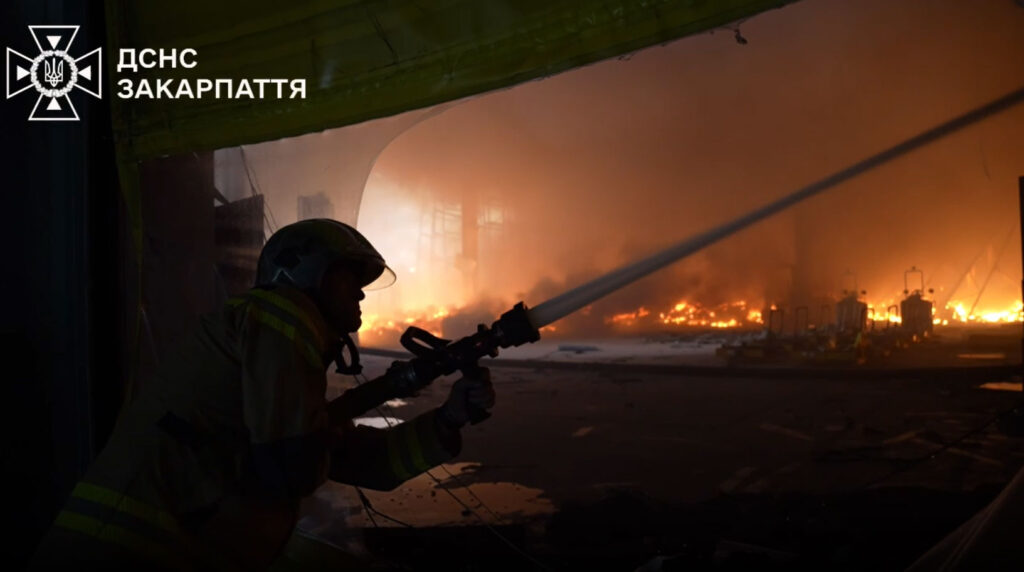NYT: Russia targets Western-linked assets in Ukraine to block peace efforts

Russia is deliberately targeting Western-linked sites in Ukraine to send a message of defiance against diplomatic efforts to end the war, The New York Times reports. The strikes — aimed at an American-operated factory and European diplomatic offices — signal a calculated rejection of peace talks and Western involvement, according to officials and military analysts cited by the outlet.
Kremlin uses strikes to resist Western diplomacy
On 21 August, Russian cruise missiles hit a factory in Mukachevo run by Flex Ltd., an American multinational company best known locally for making Nespresso coffee machines. The plant, Ukraine’s largest employer in Zakarpattia Oblast, had no role in military production, according to local officials and the company itself. Nonetheless, it became a target just six days after US President Donald Trump met with Russian President Vladimir Putin in Alaska to discuss possible paths toward ending the war.
A week later, two more Russian missiles struck central Kyiv, damaging buildings housing the European Union delegation and the British Council. The diplomatic quarter in Kyiv had previously been spared by Russian forces. Following the strikes, European Commission President Ursula von der Leyen publicly accused Moscow of intentionally attacking EU diplomatic infrastructure. Ukrainian President Volodymyr Zelenskyy said Russia is now “striking at everyone in the world who seeks peace.”
These strikes were not isolated. NYT notes that more than half of American companies operating in Ukraine have already sustained damage from Russian attacks. The list includes major international names such as McDonald’s, Boeing-affiliated facilities, and a Philip Morris plant. The Flex factory alone, which employed around 3,000 people at the time of the strike, was the largest taxpayer in its oblast and produced only commercial consumer products.
A shift toward punishing peace supporters
According to NYT, the Kremlin’s choice of targets — foreign-linked civilian infrastructure and cultural institutions — suggests a deliberate effort to intimidate and punish those backing Ukraine’s defense and sovereignty through diplomacy, investment, or postwar security guarantees. Ukrainian lawmaker Oleksandr Merezhko said the attacks are “a clear signal” that Putin now feels emboldened to extend the war beyond Ukraine and toward the West itself.
Franz-Stefan Gady, a military analyst based in Vienna, told NYT that Moscow is intentionally testing the boundaries of Western deterrence. The aim, he said, is to impose costs on Ukraine’s allies while avoiding direct military retaliation — a strategy designed to weaken Western resolve and push Ukraine into disadvantageous negotiations.
European governments are currently debating whether to send peacekeeping forces to Ukraine, and the strikes appear designed to dissuade that. Volodymyr Dubovyk, director of the Center for International Studies at Odesa I.I. Mechnikov National University, described the message from Moscow as clear: “Don’t you dare send your troops here.”
A pattern of escalation
The 28 August strike on Kyiv, which included hundreds of missiles and drones, killed at least 25 civilians — the deadliest attack on the capital since the Trump–Putin meeting. While none of the fatalities occurred at the damaged diplomatic offices, the choice of targets marked a dramatic shift in Russia’s strategy.
The Kremlin has dismissed negotiations as premature and rejected Western-proposed security guarantees for Ukraine. The Russian Ministry of Defense falsely claimed that its strike on the Mukachevo factory was aimed at the Ukrainian military-industrial complex. Russia’s Foreign Minister Sergey Lavrov told NBC News he had allegedly “never heard about” the Flex attack, while simultaneously denying that Russia targets civilian sites.
Following the attacks, President Trump said he was “not happy” with Russia’s actions. However, the US response so far has been limited to verbal disapproval, with no new sanctions or retaliatory steps announced.
